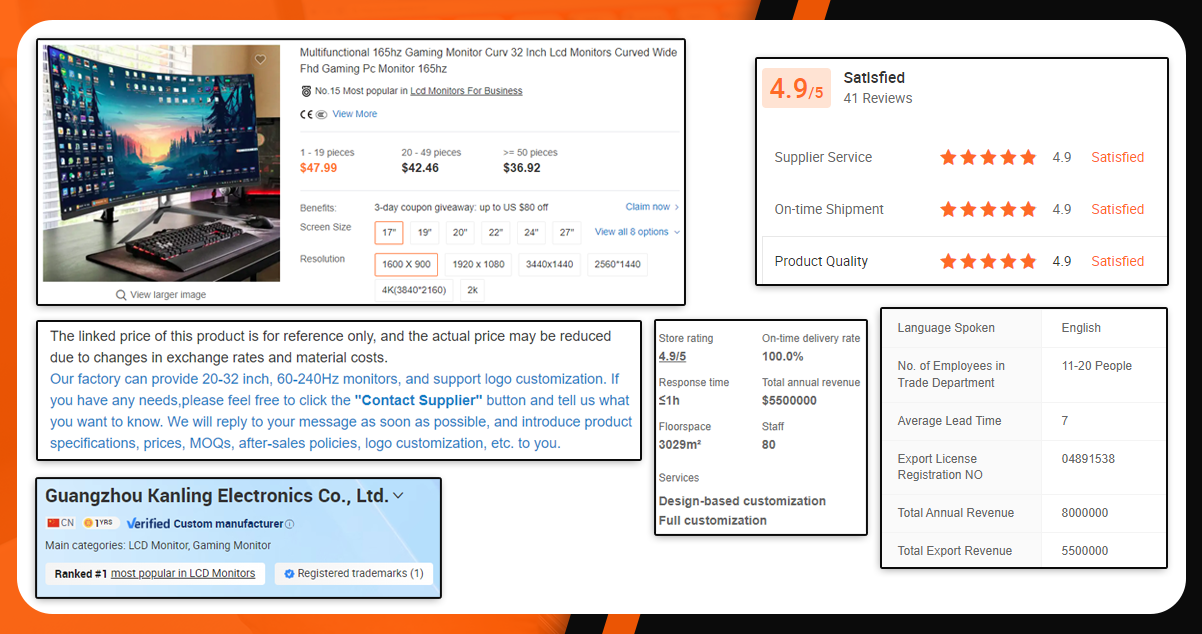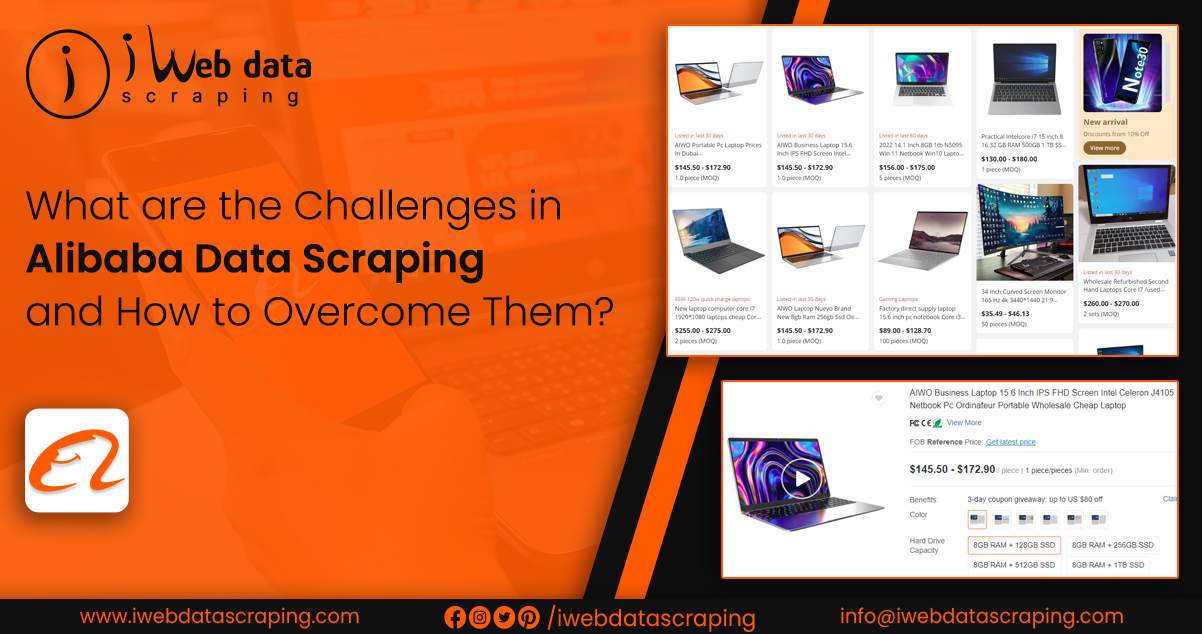Alibaba.com stands as a leading global B2B wholesale ecommerce marketplace, catering
to small-to-medium-sized businesses (SMBs) since its establishment in 1999. It serves as a
platform where SMBs can effortlessly connect with professional business buyers, enabling them to
enhance sales and leverage a comprehensive range of tools designed explicitly for B2B trade.
This leading platform offers a marketplace that facilitates connections between
businesses and manufacturers. It is a dependable data source for ecommerce sellers, allowing
them to scrape product data, find suppliers, monitor stock availability and prices, create
product catalogs, and more. In the following sections, we will explore different data types and
provide steps to overcome challenges accurately while scraping product data from Alibaba.
List of Data Fields

The Following Lists of Data Fields are available while scraping Alibaba product data
and seller information:
- Product Name
- Image
- Price
- Product Page URL
- Seller Name
- Seller Response Rate
- Minimum Order Count
- Seller Life on Alibaba in Years
How to Discover Product Data on Alibaba for Scraping?
Alibaba offers various methods to search for products based on your data
requirements:
- Keyword or Product Search: Utilize the search bar on Alibaba's website to
enter relevant keywords or specific product names. It allows you to scrape data on similar
or exact products matching your search query.
- Manufacturer Search: If you know a particular manufacturer or supplier, you
can search for their name directly in the search bar. It lets you collect the necessary data
on that specific manufacturer's products.
- Brand Name Search: You can input the brand name in the search bar to find
product data associated with a particular brand or company. It allows you to scrape data
specifically related to products offered by that brand.
These search methods provide flexibility in exploring and extracting the desired data from
Alibaba based on your requirements.
Challenges Faced While Scraping Alibaba Data
Alibaba Group encompasses various business segments, including an ecommerce
platform. However, scraping data from the Alibaba ecommerce marketplace presents unique
challenges due to the platform's stringent anti-scraping policies. These challenges include
frequent changes to website markup, IP blocking when identified as a bot, and implementing
captcha protection.
Alibaba data scraping services providers specialize in overcoming these specific
challenges associated with scraping Alibaba. Their expertise allows them to navigate these
obstacles effectively using tailor-made approaches based on specific requirements, extracting
product data from Alibaba in a customized format, and delivering the data in a ready-to-use
file.
Steps to Overcome Challenges Faced During Alibaba Data Scraping
Overcoming the challenges faced during Alibaba eCommerce data scraping requires careful
planning
and implementation. Here are some steps to help you tackle these obstacles:
- Dynamic Website Markup: To handle the changing website markup, you can
employ a robust web scraping framework that utilizes techniques such as HTML parsing or CSS
selectors instead of relying on fixed element positions. It allows your scraper to adapt to
the evolving structure of the website.
- CAPTCHA Protection: CAPTCHA measures can be circumvented by integrating
CAPTCHA-solving services or using machine learning algorithms to solve CAPTCHAs
automatically. These approaches help automate the process and ensure uninterrupted scraping.
- IP Blocking Prevention: You can implement IP rotation techniques to avoid
IP blocking. It involves rotating your IP address periodically or using proxy servers to
make requests from different IP addresses. By distributing your requests across multiple IP
addresses, you reduce the risk of being blocked.
- User-Agent Rotation: Varying the User-Agent header in your HTTP requests
can help prevent detection as a bot. Randomize the User-Agent string or rotate through a
list of commonly used browser User-Agent strings to make your requests appear more like
those from legitimate users.
- Rate Limiting and Request Throttling: Varying the User-Agent header in your
HTTP requests can help prevent detection as a bot. Randomize the User-Agent string or rotate
through a list of commonly used browser User-Agent strings to make your requests appear more
like those from legitimate users.
- Proxy Servers: Utilize a pool of reliable proxy servers to mask your
scraping activity and distribute requests across different IP addresses. It helps avoid IP
blocking and adds an extra layer of anonymity to your scraping process.
- Monitoring and Adaptation: Monitor the scraping process and adapt your
strategies per the needs. Regularly check for changes in website structure, CAPTCHA
mechanisms, or IP blocking patterns. Adjust your scraping techniques to ensure a consistent
and successful data extraction.
For further details, contact iWeb Data Scraping now! You can also reach us for all
your web scraping service and mobile app data scraping needs


